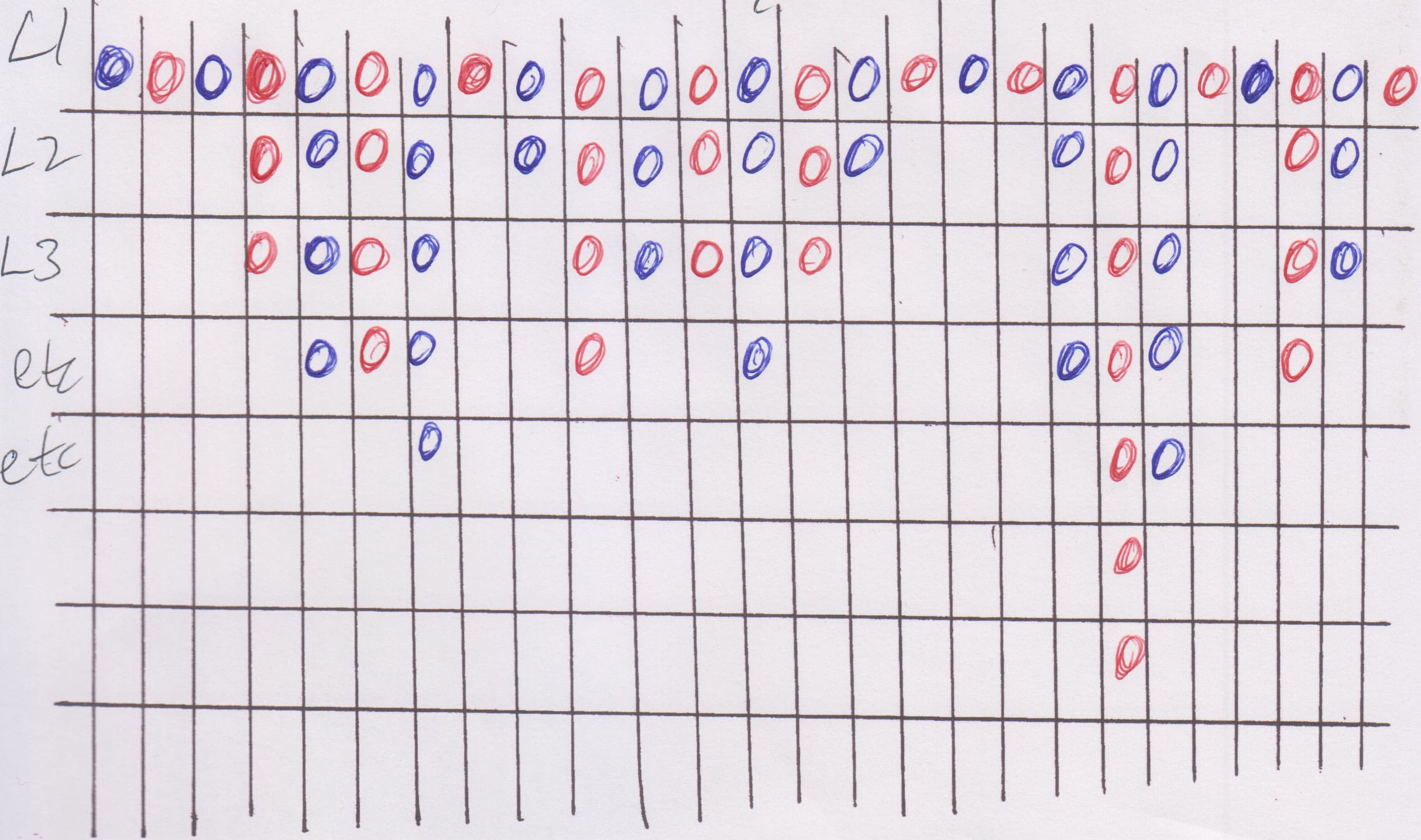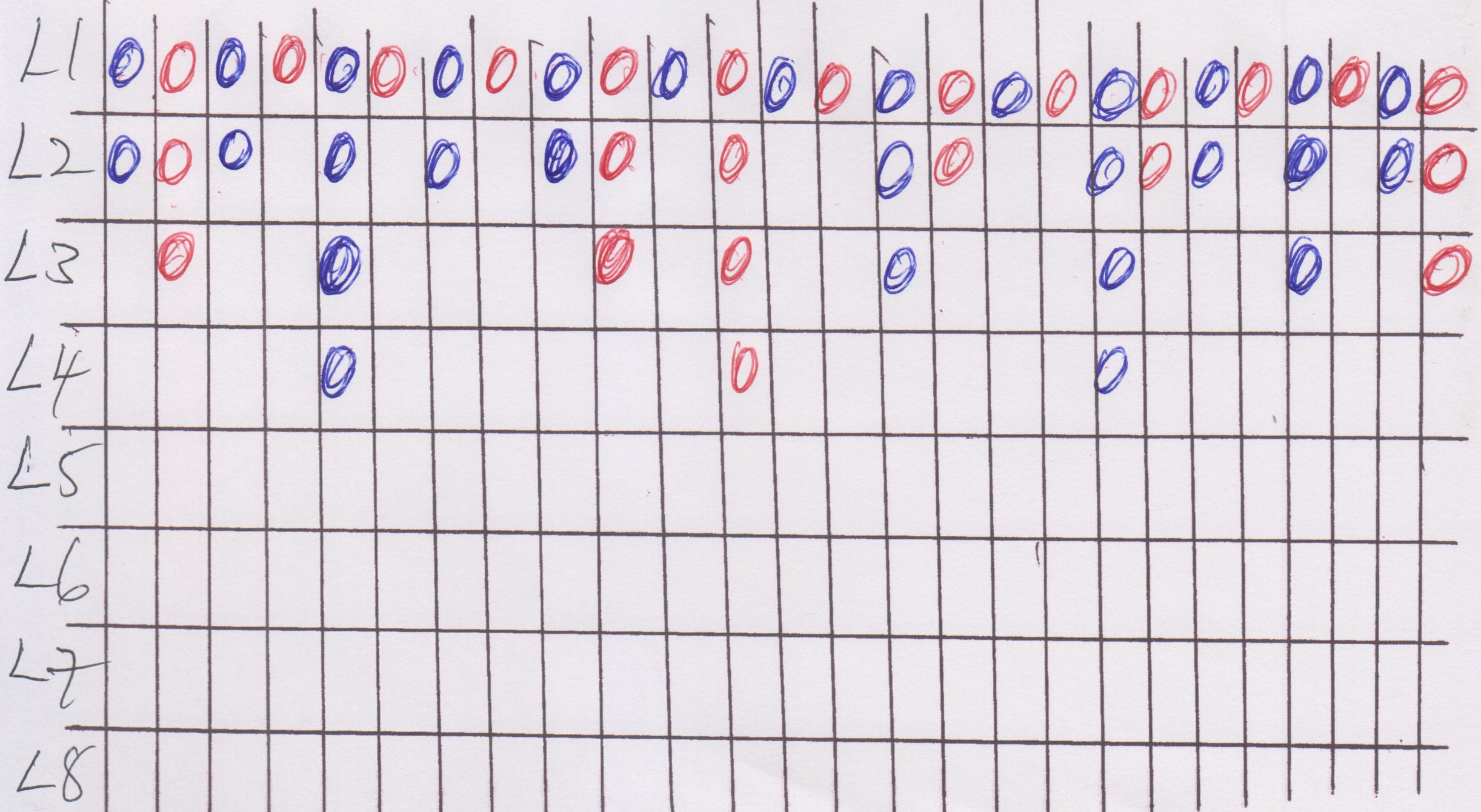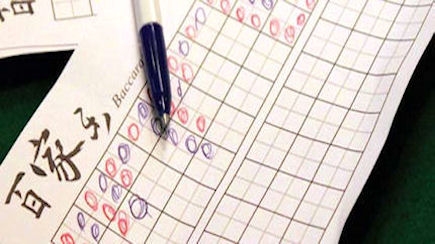Understanding Baccarat Charts
- Understanding Baccarat Charts Chart
- Understanding Baccarat Charts Music
- How To See Baccarat Chart
- Understanding Baccarat Charts Reading
Baccarat Probobility
By: CasinoAdvisor.com, Tuesday June 3rd 2008Once you understand that, then the rules for drawing a third card will make much more sense to you. If either the Player hand or the Banker is dealt a total of 8 or 9 in the first two cards (known as a “natural”), then the game is over, and the winning hand is determined on just those cards. Understanding the order of the draw (you first, then Banker) will also help you understand the real money payouts for Baccarat games. If you bet on the Player and win, you get paid out at even money. If you bet on the Banker and win, you get even money minus a 5% commission.
We are going to look at a series of tables to help you understand the Baccarat probabilities. These will change depending on the situation. First of all in the game of baccarat you are going to be playing against the banker. The hand you bet on needs to reach an 8 or 9 total, but not always. In other words the higher score of the hand will win out. You have three bets to place the banker, player or tie. You can only bet on one at a time in most casinos. If you place a bet on the banker there is a 5 percent commission out of your winnings owed to the casino. For the banker the house edge is 1.04, player is 1.24, and the tie is 14.36 percent. As you can see you are more likely to win with the house, but that is not an always situation.
The first chart we have to display shows you the probability when you have 8 decks. Most casinos will play with 8 decks in the shoe. You will also see the pay, combinations, and return in the chart. The chart is based on the banker bet.
| Banker Bet - 8 Decks | ||||
Event | Pays | Combinations | Probability | Return |
Banker wins | 0.95 | 2,292,252,566,437,888 | 0.458597 | 0.435668 |
Player wins | -1 | 2,230,518,282,592,256 | 0.446247 | -0.446247 |
Tie | 0 | 475,627,426,473,216 | 0.095156 | 0 |
Total | 4,998,398,275,503,360 | 1 | -0.010579 | |
The next chart is based on the player bet. You will notice there are slight differences in the table in the return area. The other information is close to being the same.
| Player Bet - 8 Decks | ||||
Event | Pays | Combinations | Probability | Return |
Banker wins | -1 | 2,292,252,566,437,888 | 0.458597 | -0.458597 |
Player wins | 1 | 2,230,518,282,592,256 | 0.446247 | 0.446247 |
Tie | 0 | 475,627,426,473,216 | 0.095156 | 0 |
Total | 4,998,398,275,503,360 | 1 | -0.012351 | |
This last chart is going to show the tie bet for 8 decks. You will notice the pay is 8 to 1 for the win on a tie. There are also changes in the return.
| Tie Bet — 8 Decks | ||||
Event | Pays | Combinations | Probability | Return |
Banker wins | -1 | 2,292,252,566,437,888 | 0.458597 | -0.458597 |
Player wins | -1 | 2,230,518,282,592,256 | 0.446247 | -0.446247 |
Tie | 8 | 475,627,426,473,216 | 0.095156 | 0.761248 |
Total | 4,998,398,275,503,360 | 1 | -0.143596 | |
We should also mention there are differences in the play when you have a pair. In most baccarat games you rarely bet on the pair and it will depend on the table. In some instances a pair will result when you deal the cards. If the table allows you to bet on this pair you have an 11 to 1 payout. There are only 6400 combinations to get pairs with a probability of .075. The return is .82 percent.
If you look at the chart you will notice there are more combinations for the banker to win than there are the player and especially the tie. In strategy it will be imperative to follow the better bet that you can make so that you get more winnings during the game. The probabilities will show you the frequency that you win on any given bet.
Article Tools
Comments
Add CommentAdd Comment
You must be signed-in to add a comment: - Sign-in- RegisterMore Articles
Chinese New Year Online SlotThe Fantastic Sinbad Slot Game
Romeo And Juliet In Online Slots
Usher The New Year With Fluo Party
Valkyrie Online Slot From Elk
Baccarat seems like a very simplistic game as its objective is very clear – bet on either Player or Banker and hope your hand is the winning one. However, if you go the whole nine yards and dive deep into the intricacies woven in by both experience and superstitious players, you will see there’s much more to it. Some players will try to predict their outcome based on previous results, while others will employ betting systems – both logic and superstition are equally influencing the game. In this article, we will explain the basic rules for drawing cards and how to use score boards, but before we begin, let’s have a look at the basics – card values and hands.
Baccarat Card Values
A fun fact you need to know about Baccarat besides that the “t” is silent – yes, it’s pronounced [bakaʀa] – is also the fact that the word means “zero” or “nothing”. This piece of trivia is all you need to go “Ahh!” when you learn that Tens, Jacks, Queens, and Kings have zero value in Baccarat. Ace counts as one and all other cards count as their face value 2 – 9. Total hand values cannot exceed 9, so ten is subtracted if the hand totals more than 9. If the hand is, say 4 – 9 – 5 the total would be 8 or 18 minus 10. Two 10s is a zero. A total of 8 or 9 is called a natural.
Players from Germany accepted
*T&Cs apply
Player’s Hand
The Player’s hand is always the first one to be acted upon. It’s dealt two cards initially. They are turned over by the dealer and if the total is between zero and five, a third card is dealt. If the total is between six and nine, the Player stands, which means that no cards are dealt. A “natural” is a hand of eight or nine and it’s automatically a winner against any Banker hands except 8 or 9. If the Player has a total of 8 and the Banker – 9, the Banker wins and vice versa. The house edge on Player hand is 1.24 percent and the payout is 1:1.
Banker’s Hand
The Banker’s hand is also dealt two cards and if the total is 7, 8, or 9 no additional cards will be dealt. If, however, the two-card total is between zero and three, and a three if the Player’s total is 8. Depending on the Player’s total, the Banker may still hit some 4, 5, or 6 totals. Lucky for you, you don’t need to memorize all of those as the dealers have already done it for you and will do all the hitting. And also, because you can use our handy Baccarat drawing guide that you can download for your perusal. The Banker is considered to have a slight advantage over the Player because it’s dealt second and some experts advise betting on it as they believe it will win slightly over 50 percent of the time. It does have a lower house edge – 1.06 percent and although it pays 1:1, there’s a 5 percent commission on Banker bets.
Rules for Drawing Additional Cards

In certain instances, additional cards will be drawn to either the Player or the Banker hand. These complicated rules certainly add to the sense of mystery that still surrounds the game. Which tends to give it the cachet of a more sophisticated game than it really is.
If either the player or the banker has a total of an 8 or a 9 they both stand. There is no exceptions and this rule overrides all other rules. And here are the other instances:
- If the player has total of 6 or 7, the player stands.
- If the player stands, the banker hits on a total of 5 or less.
- If the player has total of 5 or less, the player automatically hits and the banker gives the player a third card.
If the player gets the third card then the banker draws a third card according to the following rules:
- Banker has total of 0, 1, 2: Banker always draws a third card.
- Banker has total of 3: Banker draws if Player’s Third Card is 1-2-3-4-5-6-7-9-0 (not 8)
- Banker has total of 4: Banker draws if Player’s Third Card is 2-3-4-5-6-7
- Banker has total of 5: Banker draws if Player’s Third Card is 4-5-6-7
- Banker has total of 6: Banker draws if Player’s Third Card is of 6-7
- Banker has total of 7: Banker always stands.
You don’t really need to understand why these rules are as they are, and why they need to be so complicated, as this is simply how the game is played and that is that. To be fair, if the winner of the game was determined solely on the first two cards dealt then it would be more like a game of hi-lo than anything else.
Pattern Spotting

Based on the gambler’s fallacy, some players believe that the sequence of results in past hands can offer some clue as to what the outcome of the hands to come will be. In order to keep track of how many Player, Banker, and Tie hands have passed, they use scoreboards to map out previous results – a practice known as pattern spotting and casinos are perfectly fine with it. Land-based gambling halls will offer a sheet and pencil, while online, developers display the results automatically in a grid. They do this because they’re aware of the fact that these patterns and chart tracing will have no effect on the game whatsoever. This is not a winning strategy because previous outcomes don’t correlate with the next hands dealt in any way. Still, if you’re interested in finding out about those, here’s a breakdown of the most popular patterns.
Bead Plate
Other English names for it are “cube road”, “dice road”, “marker road”, “bead plate road” and even “baby pig road”. On the “bead plate” players can keep track of Player, Banker, and Tie wins and mark them with differently colored cubes:
- Blue= Player win
- Red= Banker win
- Green= Tie win
Tracing begins at the upper left hand corner all the way to the bottom row. Then, it continues over one column to the right, back to the top row.
Big Road
The “Big Road” pattern details the sequence of Player and Banker wins, ties are marked with a green line through the previous Player or Banker wins. Player pairs are designated with a blue dot in the lower right corner while Banker pairs with a red dot in the upper left corner of the hand it occurred in.

Marking this pattern starts again at the upper left, with Player wins marked in blue, and Banker wins in red. However, a new column is started every time there’s a change in Player and Banker winning. Since the grid is only six rows deep, if there are more than six consecutive wins, scoring moves to the right, which creates the so-called “dragon tail.” This is the main road and all other roads are derived from it.
Big Eye Boy
The “Big Eye Boy” is not that straightforward and could be perceived as serving the purpose of keeping statistics of how repetitive the shoe is. Red marks indicate repetition, while blue means the shoe is chaotic. Keep in mind that in this pattern, unlike in the previous two, blue and red do not relate to Player and Banker wins.
The “Big Eye Boy” table begins with an entry of the hand after the first entry in the second column of the Big Road. This provides no information based on which you can tell whether a pattern is developing or not. Every entry in the Big Eye Boy table, as well as the next two tables, will refer to a specific entry in the Big Road. It may get confusing following this sequence, but to put it as simply as possible – take a look at the last entry of the Big Road. Next, move one cell to the left and then up. If the move up does not result in a change, mark red, if it does, mark blue.
Small Road
Understanding Baccarat Charts Chart

Using the Small Road is very similar to using the Big Eye Boy, however, it skips the column to the left of the current column in the Big Road. It starts with the hand after the first hand in the third column of the big road, which means it will wait until the entry after the first entry in the third column of the Big Road. Red circles mean that the first and third columns to the left of the new column in Big Road are the same in depth. A blue circle means they’re not.
The way you move in the small road is – again considering the latest entry in the Big Road – move two cells to the left and then – up. Mark red if the move up does not result in a change, and in blue if it does.
Cockroach Pig
The Cockroach is the third road derived from the Big Road and it skips two columns to the left of the current column in the Big Road. Otherwise, it works exactly the same as the Small Road. The Cockroach Pig will wait until the entry after the first entry in the fourth column of the Big Road. Here, you will compare the first and fourth columns to the left of the new column in the Big Road. Again – a red circle will mean they are the same in depth while a blue one will mean they’re different. In order to mark the Cockroach pattern, again look at the the latest entry in the Big Road and move three cells to the left. Then, move up. Again, if there’s no change as a result of the move up, mark red. Mark blue if there’s a change.
Free Practice Play with NetEnt’s Low-Limit Baccarat
When choosing an online baccarat casino, we advise that you look up the info section of RNG baccarat games – it should contain all details that are essential to your gameplay such as RTP, rules, payouts, and functions. We’ve chosen to feature a baccarat game developed by NetEnt as they have some of the most detailed explanations on how to play baccarat, third-card draw rules, payout tables, as well as all functions of each game. This release some of the highest return-to-player rates at
- Banker: 98.94%
- Player: 98.76%
- Tie: 85.64%
Understanding Baccarat Charts Music
To avoid any confusion, the game features a chart for third card rules, scoring, and payout schedule with examples. All the features and controls are also explained in detail, so you will have no trouble playing regardless of your experience with the game. A history of previous bets stays open so you can keep track of previous results if you’re marking them down for patterns.
How To See Baccarat Chart
Is It Worth Using Pattern Spotting?
Learning the intricacies of these patterns can be an arduous task. Generally, what you need to know about these charts is that red circles represent Banker wins and blue circles – Player wins. Green is for Ties. The Big Road is the main road and all other ones consider its latest entry. Luckily, these days casinos will spare you the struggle and offer digital displays of the roads, detailing all the wins, and providing more information without error as they are directly connected to automatic card reading shoes. Normally, each road is six symbols in height and in electronic displays, Big Eye Boy, the Small Road and the Cockroach Road use symbols of half a cell’s height and width, which means that three rows of cells can fit six symbols vertically.
However you choose to use these patterns, whether scoring them yourself or following the electronic display, keep in mind that they’re entirely based on superstition and the false sense of control part of the gambling psychology, so they won’t decrease the house edge and won’t give you an advantage or guarantee you more or bigger winnings. If you want to get an authentic Macau Baccarat feeling, then you can use these, as well as other rituals such as the squeeze or blowing on cards to banish bad luck with the same effect.
| Casino | Bonus | Accepts | Live | Side Bets | Rating | Details | Play |
|---|---|---|---|---|---|---|---|
| 22bet | 300€ | yes | yes | 6/6 | Review | Play Now | |
| PlayAmo Casino Review | 300€ | yes | yes | 6/6 | Review | Play Now | |
| Spinia Casino Review | 250€ | yes | yes | 6/6 | N/A | Play Now |
Understanding Baccarat Charts Reading
*T&Cs apply